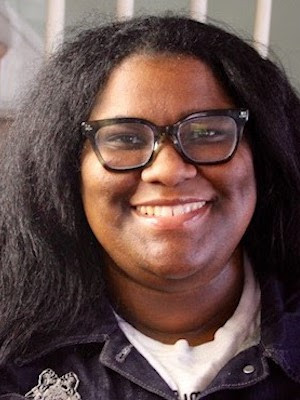Alumni Spotlight: B.A. Parker '12

The Alumni Spotlight is a place to hear from the School of the Arts alumni community about their journeys as artists and creators.
B.A. Parker '12 is a writer and audio producer from Baltimore. She holds a B.A. in English from Morgan State University, and an M.F.A. in Film focused on Screenwriting from Columbia University. Upon graduation, she taught screenwriting and film history at Morgan State University and Stevenson University. Parker received a production fellowship with the Peabody and Pulitzer Prize-winning radio show This American Life, contributing stories that include “The Miseducation of Castlemont High” and “Their Eyes Weren’t Watching God.” Parker’s work can also be heard on NPR’s Invisiblila, Gimlet’s Heavyweight, WNYC’s Nancy, and recently as co-host and lead producer of The Cut podcast with New York Magazine. She currently lives in Brooklyn.
Was there a specific faculty member or peer who especially inspired you while at the School of the Arts? If so, who and how?
B.A. Parker [BAP]: I learned structure and I learned techniques from coveted faculty. But I was also an extremely young, Black woman who was thrust into a world and dynamics that were completely foreign to me with no real guidance. Honestly, the most inspirational forces in my life and work from that time came from the lovely women who worked in Columbia’s Film Office – Sara Mason (former Director of Academic Administration), Hanna Seifu (current Director of Academic Administration), and Jenny Tromski (former Director of Risk Management and Production Administration). They helped me stay in school, they saw my potential and made me put my work out there, they listened to my story ideas and asked questions, they got me into improv classes downtown, they took me to films at Lincoln Center, and they each let me crash on their couches after I graduated. Those three women saw me in a program where it was often difficult to be seen.
How did attending the School of the Arts impact your work and career as an artist?
BAP: Attending the Film Program allowed me to find my voice. It was the first time I ever realized I was funny and could use that in my storytelling. I could make “happen to be” stories – stories about people who happened to be marginalized but their marginalization isn’t the defining factor of their narratives. That informs the interviews and the essays that I write today. The School of the Arts emboldened the seeker in me, which is paramount in audio storytelling. Making podcasts, I’m always thinking about delivery and rhythm and the journey. All of that comes from the tools I learned in the Film Program.
What were the most pressing social/political issues on the minds of the students when you were here?
BAP: Student loan debt and grad school affordability was extremely pressing at the time, as it is all of the time. But looking back, starting an M.F.A. at the cusp of a global financial crisis seems like a bonkers idea. Losing classmates mid-semester or at the brink of graduating may be par for the course when it comes to higher education, but it felt much more malignant at the time. For a lot of underprivileged students like myself, it crystallized who could and could not afford to make art and whose voices would later on get platforms for any kind of sociopolitical change.
What was your favorite or most memorable class while at the School of the Arts?
BAP: I always looked forward to the Script Analysis class taught by David McKenna. He would come into the screening room donning his cowboy boots and ready to tackle the themes in Who’s Afraid of Virginia Woolf? There was such a great room for play, where it was totally encouraged that I write a ten-page paper exploring the structural genius of Point Break… which I did.
What advice would you give to recent graduates?
BAP: Pray. I’m just kidding. Really think about what you have to say and how you want to say it, and if the path that you’re on will allow you to say it. My path was rocky after graduation, but I found work that was sustainable for me until I was able to be a full-time artist. For film school graduates, there’s no real preparation for the outside world after graduation, aside from asking: what does betting on yourself look like? So be patient, because it might take a while.